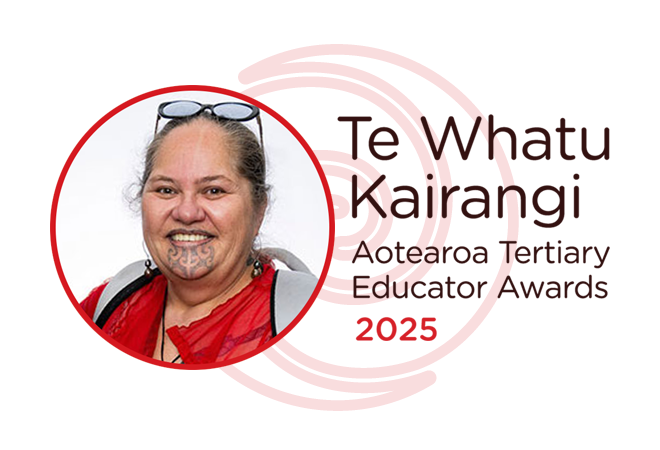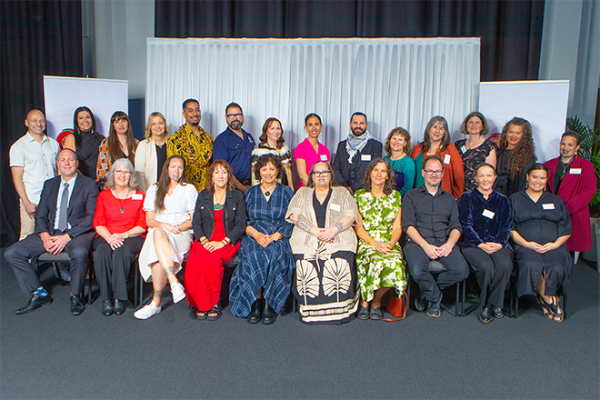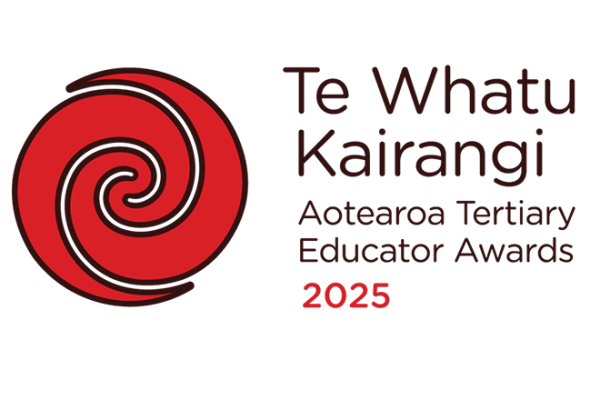Haani Huata-Allen
Learning is easy, learning is fun, learning is easier in a stress-free environment
Te Tohu Reo Māori Award winner
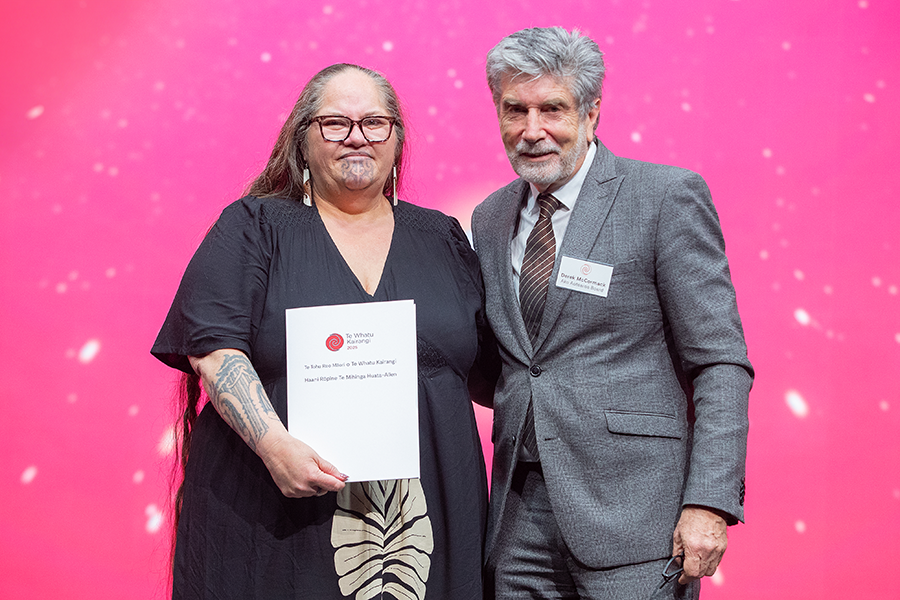
Waikato-Maniapoto, Ngāti Kahungunu, Ngāti Porou, Ngāti Whakaue me Ngāti Pikiao
Head of Leadership Development and Reo and Cultural Capability, Te Wānanga o Aotearoa
Haani’s foray in to supporting the te reo Māori language learning journey of students began in 1986 where she started out as a tutor in various Māori language papers at the University of Waikato, under the expert guidance of Haupai Puke, Dr Te Rita Papesch, Sir Tīmoti Kāretu, Dr Ngāhuia Dickson, Professor John Moorfield and Professor Te Wharehuia Milroy. I name these people to show the calibre of expert Māori language speakers and teachers who were key influencers in the development of Haani’s own teaching practice that she has sustained at a high level for the last 39 years.
Her nominators describe how “Her students have had access to her considerable skills and to the body of knowledge she developed through growing up immersed in te ao Māori, she recognises the privilege and duty of preserving and sharing this knowledge in ways that maintain its integrity and vitality for future generations.”
Haani started as a lecturer at the University of Waikato in 1990, which at the time also saw her teaching their papers to local high school students and in the Early Childhood teaching programme. In 1999 she moved to Christchurch to teach in the Māori Language programme at the University of Canterbury where she, alongside Dr Te Rita Papesch, revamped the undergraduate programme and introduced the full immersion Masters of Te Reo Māori. Haani left there in 2003 and started working at CPIT (now Ara) as the Head of the department, where she taught from Level 3-7 and introduced an immersion Bachelor’s degree alongside Dr Eruera Tārena. In 2011 she moved back to Hamilton and has been employed by TWoA ever since in curriculum design of professional development for kaiako across the whole country, supporting the delivery of wānanga reo, and at different times, as a kaiako in the immersion programmes. She is currently the Head of Leadership Development and Reo and Cultural Capability.
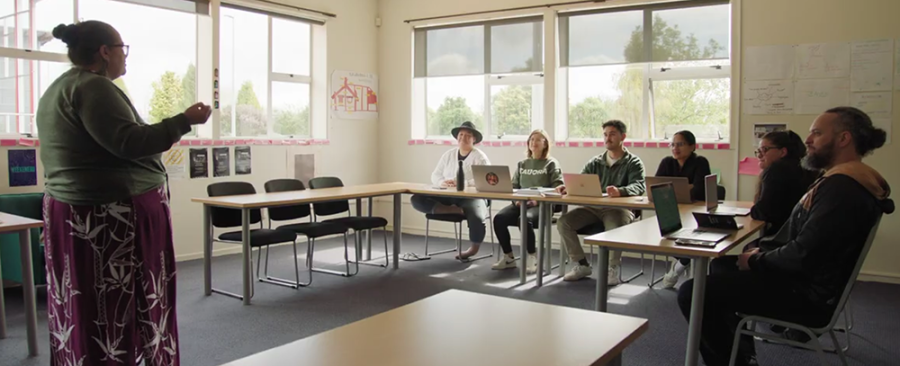
What drives her teaching is her belief that every student she teaches will eventually lead to the reestablishment of te reo Māori as the primary language of their home. For example, one of her nominators, Hemi Hoskins, entered into her classroom at CPIT with limited reo. He completed his Bachelor of Language (Māori) with Haani, which provided him with the language base to be invited to attend Te Panekiretanga o Te Reo (The Institute of Excellence in the Māori Language, which is an invitation-only course). He started teaching te reo at CPIT and when Haani left, he took over her job as Head. His children are first-language speakers of te reo Māori and he is now her upline manager at TWoA. This is one of her greatest highlights of being a kaiako – seeing her former students raising their children in te reo Māori, which we saw as a significant impact of her teaching – when the student walks in the same shoes as the kaiako.
Alongside her academic leadership in teaching te reo in the tertiary sector, Haani has also taught at Kutatahi, Te Kura Reo o Maniapoto and is a key member of He Reo Pūrekireki, developing and implementing a te reo Māori revitalisation strategy for Purekireki Marae situsted in Pirongia. For this kaupapa Haani is involved in setting up and supporting 5 wānanga a year for whānau that will increase the capabilities of whānau members to perform pivotal roles as kaikaranga and kaikōrero for Pūrekireki Marae. She is also a kapa haka expert, and has used her reo skills to create compositions for kapa haka that she has been involved in around the country.
Her teaching practice does not just sit within the classroom but throughout all aspects of her life. She regularly takes students to marae, various kaupapa, and invites community members, in particular elders, into the classroom. She works across departments, often bringing te reo into spaces where it is seldom heard. One year her students formed their own class kapa haka group and performed at the Waitaha Senior Kapa Haka Regional Competitions. She exemplifies te reo as not just a language of the classroom or a subject of study but as part of a way of life.
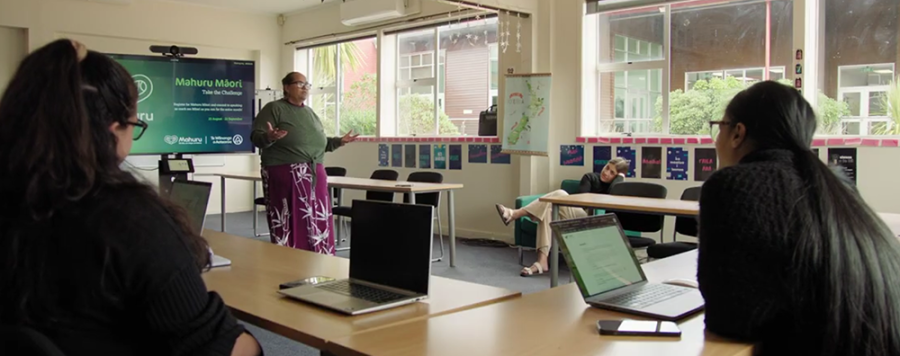
Haani’s practice is reflective, engaging and current. Her students range from highly proficient speakers to those with little reo; from young to old, many of whom are dealing with intergenerational language trauma. Therefore, she is compassionate in her approach and strives to provide a safe environment for all her tauira (students). Haani pivots and is able to align activities, often unplanned, with the language level and interest of the student, in real time. She is pivotal in creating strong reo Māori domains within the communities that she has lived in, knowing that they are domains that her students then interact with and in.
She is not afraid to have difficult conversations with tauira and they soon realise that it comes from a place of passion and aroha for te reo so that they too strive for excellence as embodied in the phrase that underpins Haani’s teaching, ‘ko te reo kia tika, ko te reo kia rere, ko te reo kia Māori’ – accuracy of te reo, fluency of te reo, and naturalisation of te reo.
Her nominators said: “As we think about the achievements of this remarkable woman we are filled with joy, our wairua are uplifted. There are many people who have benefitted from her mentorship, many reo students who have been gifted with her teachings. It is true that the mind is perhaps the home of the skills that make a learned person successful. But it is in her heart you find aroha for the revitalisation of te reo that has been implanted into those who have learnt from her.”
